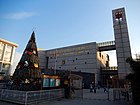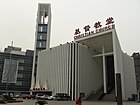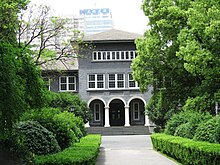Chinese Christian Council

The Chinese Christian Council (Chinese: 中国 基督教 协会Zhōngguó Jīdūjiào Xiéhuì , English: China Christian Council , abbreviation: CCC) is an umbrella organization of Protestant Chinese Christianity founded in 1980. It is the only church in the People's Republic of China that is a member of the World Council of Churches ; it joined in 1991. According to its own information, the Christian Council represents 23 million members and 27,000 pastors in 60,000 congregations. He cooperates closely with the Patriotic Three-Self Movement (Three-Self Patriotic Movement, TSPM), a mass political organization founded in the 1950s; Both are close to the state - also in terms of their self-image.
Church leadership
The governing body of the Chinese Christian Council currently (as of 2018) consists of the following people:
- President: Gao Feng (* 1962 in Qihe, Shandong). He studied at the American Lutheran Seminary and the Lutheran Theological Seminary in Hong Kong, where he also received his doctorate.
- Vice President and General Secretary: Kan Baoping (* 1957 in Jinzhou, Liaoning). He earned a Master of Divinity from the School of Religious Studies, McGill University .
- Vice President: Shan Weixiang (* 1964 in Yuyao, Zhejiang). His theological training took place at the Nanjing Union Seminary.
- Associate Secretary General: Lin Manhong (* 1966 in Xiamen, Fujian).
Christian Council and Three-Self Movement
The exact relationship between the Christian Council and the Three-Self Movement is opaque. In the opinion of observers, both practice a division of labor, with the Christian Council taking on internal church tasks such as training pastors and printing Christian literature, while the three-self movement, on the other hand, maintains contact with government agencies. Since the Three-Self Movement is an organization of the Chinese Communist Party and belongs to the united front, it is de facto superordinate to the Christian Council. Personnel overlaps are common.
Church buildings
Building a new church or expanding it is also difficult for congregations under the umbrella of the Chinese Christian Council. In 2014, in Zhejiang Province , there was a state-controlled demolition operation, in which crosses were torn from church roofs and entire churches were destroyed; the authorities justified this action with a campaign against illegally constructed buildings. In the Pingyang District , 135 churches organized in the Christian Council called for peaceful resistance to the coercion.
Examples of Christian Council church buildings
| image | place | Surname | Construction year | description |
|---|---|---|---|---|

|
Shanghai | Holy Trinity Church | 1869 | Built for the Anglican Church. Restored in 2006, since then the center of the three-self movement. Not yet open for church services in 2018. |

|
Beijing | Chongwenmen Church | 1905 | Built in 1870 for the Methodist Episcopal Church. In the Boxer Rebellion , burned down after the church in its present form was rebuilt. Regular church services, also in Korean. |
| Shanghai | Community Church | 1925 | At the time of construction the largest church in Shanghai, can accommodate 700 people. Regular church services, also in English. | |
| Harbin | Si Cheng Hall | 1927 | Built by pastor Zhang Cheng Zhai with references to Chinese architecture. Converted into a library during the Cultural Revolution, made available again for worship after 1981. Various renovations, most recently in 2005. | |
| Wuhan | Rongguang Church | 1931 | Built by the London Mission Society and named after Griffith John, the first missionary in Wuhan. Damaged in the Second World War, but repaired by the Christian population. In 1993 it was placed under protection as a monument. Regular church services. | |
| Xiamen | Ximen Street Church | 1935 | 1997 enlarged. Regular church services. | |

|
Xiamen | Xinjie Church | 1935 | Oldest Protestant church in China, built as early as 1848; New building after the roof collapsed in 1928. Regular church services. |

|
Harbin | Heilongjiang Hallelujah Church | ? | Open for worship since the 1990s; regular church services. |
| Cheng you | Enguang Church | 1930s | Built for the Canadian Methodist Mission. Regular church services. | |
| Xinjiu | Yushui Church | 1985 | Regular church services. | |
| Kunming | Yunnan Trinity International Church | 2004 | The previous church, Holy Trinity Church, was built in 1904. Mega church; regular church services. | |

|
Beijing | Chaoyang Church | 2005 | Regular church services. |

|
Beijing | Haidiang Church | 2007 | Mega church; regular church services. |
Christian Council and House Churches
The large number of house churches in China is a result of the lack of church buildings. There are house churches that seek an underground existence, and there are house churches that are independent from the Christian Council but are registered with the state.
The majority of the church members in the Chinese Christian Council, more than two thirds, are themselves organized in house churches, two types can be distinguished:
- House churches as regular members that form a kind of branch of a church affiliated to the Christian Council;
- House churches that do not register with the state, but are de facto part of the Christian Council structure. Pastors who belong to the Christian Council work here with sermons, pastoral care and casualia . The Bibles and other resources used come from the Christian Council. This type of care for house churches corresponds to the official policy of the Christian Council.
Most of the Chinese Protestant Christians live in the countryside. Most of the house churches are also located there. In their piety and culture, there is little difference between the house churches affiliated with the Christian Council and those who remain outside this network.
The church leadership of the Christian Council and the urban parishes are faced with the challenge of how to cooperate with the rural base (over 80 percent of the members). This applies to both an ethical orientation in the rapidly changing Chinese society and social diaconal offers under the umbrella of the church.
Theological profile
“The Chinese Christian Council sees itself primarily as a service organization. The church in China is on the way to a unified church and the Christian Council is not an authoritarian body. ”Accordingly, dogmatic positions in self-portrayal are avoided, under doctrines some points considered important are explained in question and answer form on the church's own website. The Bible plays a key role.
The Church confesses God as the Creator of the world and Lord of history. The doctrine of the Trinity is affirmed as being biblically founded.
The Bible as a book contains the word of God and is therefore to be venerated, but not to be used magically. The Christian should read the Bible frequently and think about its contents. One should not tear the biblical statements out of context and should not lose oneself in details, but should perceive the larger lines of the biblical presentation.
The Church practices the baptism of believers .
There are different rites at the Lord's Supper, according to the denominational traditions from which the respective local congregations originate.
Seminars
The following training centers are subject to the Chinese Christian Council:
- Nanjing Union Theological Seminary. In 1911 eleven theological seminars in eastern China merged to form the Nanjing Theological Seminary. In 1961 the Yanjing Union Theological Seminary was formed from a comparable merger, and both merged to form the Nanjing Union Theological Seminary (QiaoGe Road 100, Jiang Ning University Town, Nanjing). The seminar provides theology students from all over the country with a theological postgraduate course and the opportunity to do a doctorate. The principle of the seminar is to train religious leaders who love the country and the church and adhere to the three-self principles. Here you will receive comprehensive spiritual, moral, intellectual, physical and cooperative training. Students should have particular spiritual and theological aptitudes that can unite believers and be willing to serve the Church and society.
- Heilongjiang Theological Seminar in Wanbao, Songbei District, Harbin (founded in 2012): Courses in theology, church music, special training and organ music are offered.
- Guangdong Union Theological Seminary at 9 Dongping Middle Road, Baiyun District, Guangzhou. It emerged from the Canton Union Theological College founded in 1914, which was operated by eight mission societies and three denominations. This was closed by the government in 1960 and reopened in 1986 under the new name. The facility has offered three-year college training and four-year theological undergraduate studies since 2009.
- Yunnan Theological Seminary. In 1950, five Bible schools joined forces for this seminar. In 1989 it was reopened as a training facility under the Chinese Christian Council and the Three-Self Movement. This has been located at the current location Xiaotun Road, Puji Office, Wuhua District, Kunming since 2006. A three-year college education is offered here; the approximately 230 students come from fourteen different ethnic groups. About 60% of the courses have a theological content, the rest a cultural one.
- Sichuan Theological Seminary. The facility at 19 North Sishengci Street, Chengdu, was established in 1987 by the Chinese Christian Council and the Three-Self Movement. The approximately eighty students mostly belong to national minorities.
- Yanjing Theological Seminary. This seminar, founded in 1986 by the Chinese Christian Council and the Three Self Movement, serves to train prospective pastors for the north and north-west provinces of China; it is the only theological training center in Beijing (181 QingHe Road, QingHe, HaiDian District). A four-year basic course is offered with the subjects of Bible studies, church history, systematic theology, practical theology and patriotism education.
- Jilin Bible School. This facility (Nanguo Lane, South Nong'an Street, Kuancheng District, Changchun) was established in 2010 for around 80 students. It offers postgraduate studies with a profile similar to that of the Nanjing Union Theological Seminary.
- Jiangsu Theological Seminary. The seminary was founded by the Chinese Christian Council and the Three-Self Movement in 1998 and has been approved to offer postgraduate courses since 2010. It is located at 5 North XianYin Road, XianLin University Town in Nanjing. The holistic approach of the training corresponds to that of the Nanjing Union Theological Seminary.
- Fujian Theological Seminary (121 FuWan Road, CangShan District, Fuzhou). The establishment of the China Christian Council and the Three-Self Movement in 1983 focused on training for practical service in the Church. It prepares students for postgraduate studies.
Publications
The sale of Bibles in government bookstores is not allowed in China. But they are available in private and church bookshops.
The Three Self Movement decided in 1980 to reprint Bibles, hymn books, and religious literature. In 1989 the Christian Council established a Bible Committee. In 1990, 70 Bible distribution centers were established across the country. Another measure was changing traditional characters to short characters in order to make the Bibles more readable for younger Chinese. This modernized version of the Chinese Bible was available from Easter 1989. In 1993 a revised version with new punctuation and pinyin index was published. These Bibles are printed exclusively by Nanjing Amity Printing Company Ltd. (南京 爱德 发展 有限公司Nanjing aide fazhan youxian gongsi ).
Behind this publishing house is on the one hand the Amity Foundation , a charitable Christian organization founded in 1985 which, with the support of international partners, is active in the fields of health care, educational work and rural development, and on the other hand the United Bible Society . In addition to Bibles, hymn books, Bible studies, teaching materials and Christian literature are also printed.
Web links
- Joint website of CCC and TSPM: Official Website of the Protestant Church in China
literature
- Chinese Christian Council: Christian teaching explains to all beginners in the faith . German edition ed. from: Evangelical Mission in the area of the Federal Republic of Germany and West Berlin, Hamburg 1985. ISBN 3767579197 .
Individual evidence
- ^ Beijing Haidian Christian Church. In: Official Website of the Protestant Church in China. Retrieved November 18, 2018 .
- ↑ Chinese Christian Council. In: World Council of Churches. Retrieved November 18, 2018 .
- ^ Leadership, China Christian Council. In: Official Website of the Protestant Church in China. Retrieved November 18, 2018 .
- ↑ Claus Röck: The main thing is patriotic. Protestant Faith in China. In: SWR August 2 , 2010, accessed on November 18, 2018 .
- ↑ Authorities tear down hundreds of crosses from churches and intimidate believers. In: Society for Threatened Peoples. June 24, 2014, accessed November 18, 2018 .
- ↑ a b c Christoph Waldmeier: Underground Church and House Churches in relation to the Chinese Christian Council (CCC) and the Three Self Movement (TSPM). In: Swiss Evangelical Church Federation. Retrieved November 18, 2018 .
- ↑ China. In: Center for Mission and Ecumenism. North Church, accessed November 18, 2018 .
- ↑ a b c Introduction to Doctrines. In: Official Website of the Protestant Church in China. Retrieved November 18, 2018 .
- ↑ a b c d The Protestant Church in China: "... because you have not yet gone the way". In: WCC Feature. WCC, February 21, 2001, accessed November 18, 2018 .
- ^ Nanjing Union Theological Seminary. In: Official Website of the Protestant Church in China. Retrieved on November 18, 2018 (English): "The principle of the seminary is to training religious leaders who love the country and the church, adhere to the three-self principles (self-governance, self-support and self-propagation), achieve the all-round spiritual, moral, intellectual, physical, cooperative development, have great attainments on spiritual and theological fields, good at uniting belivers, and are willing to serve the church and the society. "
- ^ Heilongjiang Theological Seminary. In: Official Website of the Protestant Church in China. Retrieved November 18, 2018 .
- ^ Guangdong Union Theological Seminary. In: Official Website of the Protestant Church in China. Retrieved November 18, 2018 .
- ^ Yunnan Theological Seminary. In: Official Website of the Protestant Church in China. Retrieved November 18, 2018 .
- ↑ Sichuan Theological Seminary. In: Official Website of the Protestant Church in China. Retrieved November 18, 2018 .
- ^ Yanjing Theological Seminary. In: Official Website of the Protestant Church in China. Retrieved November 18, 2018 .
- ↑ jilin Bible School. In: Official Website of the Protestant Church in China. Retrieved November 18, 2018 .
- ^ Jiangsu Theological Seminary. In: Official Website of the Protestant Church in China. Retrieved November 18, 2018 .
- ^ Fujian Theological Seminary. In: Official Website of the Protestant Church in China. Retrieved November 18, 2018 .




